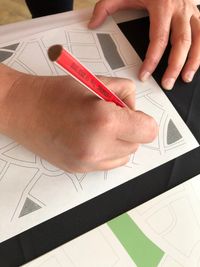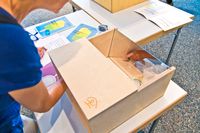Information in English
We present: The Dementia Simulator
Nurses, relatives and all who are engaged with people with dementia due to their education, their profession or as volunteers have to adjust to new and sometimes quite difficult situations.
People with dementia constantly change their behaviour as part of the progress of their severe illness. And even though everything makes sense to them, it is not always comprehensible to us. In the course of their illness, they continuously perceive themselves and the world differently or even as completely alien. People with dementia often demonstrate intense emotions and it is not always easy for us to react to them adequately. This makes it difficult to understand people with dementia.
It would be good to be able to relate to how people with dementia feel. This has now become possible with the new educational material of Hands-on Dementia.
The 14 everyday situations of the Dementia Simulator help you experience what the symptoms of dementia feel like.
Hands-on Dementia simulates the symptoms of dementia. The Dementia Simulator leads you through an ordinary day in 14 everyday situations, ranging from getting dressed through to dinner time. People who do not suffer from dementia can experience what the symptoms of dementia feel like.
The participants are led to explore their own limits, to feel discomfort and their own incapacity. This results in negative feelings, just like for people with dementia on a day-to-day basis. Through the experience of their own intense emotions, participants develop a better understanding for patients. And it is particularly helpful for the difficult everyday situations of life where people with dementia can be met with more empathy.
The Dementia Simulator consists of 14 everyday situations with a booklet and sample material.
Each booklet starts with the story of Jane Miller.
At the end of each everyday situation you will receive some key information, things worth-while knowing about the symptoms of dementia. This, however, cannot replace in-depth information and individual counseling.
Assembly
For the assembly of the everyday situations you will need:
• 8 tables with a minimum size of 80 x 80 cm/ 32”x 32”
• 4 small tables (only for storage)
• 1 table with a minimum size of 95 x 75 cm/ 36” x 30”
• 2 chairs, placed opposite each other.
The 8 wooden boxes (multiplex) with integrated mirror can be disassembled.
Size of the boxes: 40 cm x 40.5 cm x 21,5 cm (disassembled: 40 cm x 40.5 cm x 0,6 cm) / 15 ¾” x 16” x 8 ½” x (disassembled: 15 ¾” x 16” x ¼”)
The Dementia Simulator is suitable for demonstrations in
- Educational institutions
- Training seminars
- Schools for geriatric care
- Vocational schools
- Elementary schools
- Secondary schools
- Colleges
- Universities
- All vocational schools for healthcare
- Hospitals
- Pharmacies
- Health Insurance companies
Hands-on Dementia is suitable during
- Seminars
- Workshops
- Classes
- Public events
- Promotional events
- Exhibitions
- Symposiums
- Further education classes
- Counseling events
- Self-help and peer groups
- Curricula
Hands-on Dementia serves as educational material for
- Skilled health care workers
- Pupils
- Students
- Elderly care nurses
- Medical doctors
- Counselors
- Volunteers
- Non-medical practitioners and -nurses
- Health carer and nurses
- Social workers
- Psychologists
- Psychotherapists
- Service providers
- Physiotherapists
- Ergo-Therapists
- Speech therapists
- Researchers
- Assistants at Colleges
- Employees of financial institutions
- Employees of the Department of Transportation
- Administrative personnel
- Employees of museums
- Participants in theater projects
- Retail workers (bakers, hair dressers…)
- Pharmacists
- Employees of health insurance companies
- Civil servants working with the public
… and all those who care about people with dementia
Purchase
Hands-on Dementia is completely protected, Leon Maluck holds the copyright, it is a registered trademark in and outside of Germany.
With the purchase of Hands-on Dementia you also receive the unconditional right to use the Dementia Simulator however often you wish during your events, training courses, etc. You are also entitled to rent out the Dementia Simulator for a fee. The purchase, however, does not give you the right to reproduce or sell the Dementia Simulator or parts of it. In case of renting the Dementia Simulator to third parties, the owner has to ensure and clarify by contract that it is illegal to infringe upon the copyright.
Translation in other languages
Hands-on Dementia has so far been translated into 5 languages: Italian, English, French, Dutch, Spanish and Turkish.
The Dementia Simulator in all foreign languages consists of 9 everyday situations with a total of 4 boxes.
The costs amount to €1,860.
Whether taxes or further fees have to be charged is contingent on the country of destination. This also applies to freight charges which vary daily according to the country of destination.
May I introduce myself
My name is Leon Maluck, I was born in Remscheid, Germany, in 1997. I also went to elementary and high school there.
After graduating from school, I decided to do a gap year in a major psychiatric clinic. Here, I was able to gain experience dealing with people who suffered from chronic or acute mental illnesses.
As of kindergarten, I went to integrative schools. For me, fellow students with disabilities were a “perfectly normal” part of everyday life. I therefore worked for a few months in an integrative school. During this time, my decision formed to study psychology. In 2019, however, I interrupted my studies of psychology at the Medical School in Berlin. After further orientation of working as an integrational assistant in daycares and seniors’ facilities, I decided to change university courses. As of 2020, I am enrolled in a teachers’ training course for German and social studies/ politics & society for high schools in Passau.
My experience
Even during my time at school, I had the opportunity to engage with people with dementia. Thanks to this experience, I was able on the one hand to learn a lot about the illness and on the other hand about the people who behave differently from what I was used to. I found it difficult to react appropriately. It rendered me unsure and somehow helpless, because I couldn’t understand the unusual behavior of people with dementia.
With the help of my family, friends and above all dedicated professionals who are able to look back on a long history of experience with people with dementia, I started developing Hands-on Dementia in 2015.
It was a long way to realizing this project, a path that ultimately also helped me understand dementia as an illness. By way of simulating the symptoms of dementia I have gained a better understanding of the people who suffer from dementia and am now able to relate to their situation far better.



